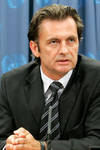The Global Institute for the Prevention of Aggression was established in 2010 as a project of The Planethood Foundation, a small private foundation founded in 1996 by Benjamin Ferencz, a former Chief Prosecutor at the Nuremberg Trials and a lifelong advocate of the rule of law in international affairs, and his son, Donald Ferencz, an attorney and international justice educator and advocate. The Institute was convened by Don as a cooperative network of interested parties to help further dialogue and information-sharing specifically aimed at advancing the goal of criminalizing the illegal use of force. The Institute is actively working to increase its effectiveness by partnering and leveraging on a formal basis with other institutions, and it has recently become formally affiliated with Middlesex University School of Law (in London). It benefits from the advice of its Council of Advisors, comprised of scholars, diplomats, and non-governmental advocates who share a commitment to outlawing the illegal use of force in international affairs, in the hope that criminalization of acts constituting the illegal use of armed force will deter such illegal acts.
For any requests particularly addressing the institute, please send an email to: donferencz@aol.com

The work of the Global Institute is informed by a Council of Advisers, which is composed of leading figures in the field of international criminal law in general, and the crime of aggression in particular. The members of the Council of Advisers are:
 Prince Zeid Ra’ad Zeid Al-Hussein
Prince Zeid Ra’ad Zeid Al-Hussein
Permanent Representative of Jordan to the United Nations; first President of the Assembly of States Parties to the Rome Statute of the International Criminal Court (2002-2005); Chairman of the Special Working Group on the Crime of Aggression at the first Review Conference of the Rome Statute of the International Criminal Court in Kampala (June 2010).
 Stefan Barriga
Stefan Barriga
Deputy Permanent Representative of Liechtenstein to the United Nations; served as principal legal adviser to chief negotiators on the crime of aggression from 2003 until the 2010 Review Conference at which the amendments were adopted.
Cherif Bassiouni
 Michael Bazyler
Michael Bazyler
Professor of Law (Chapman University); leading authority on the use of American and European courts to redress genocide and other historical wrongs.
Roberto Bellelli
 Jutta F. Bertram-Nothnagel
Jutta F. Bertram-Nothnagel
Director of Relations with Intergovernmental Organizations for the Union Internationale des Avocats, serving as Permanent Representative to the United Nations and to the ICC Assembly of States Parties; led the CICC Team on the Crime of Aggression (2001-2010); attended the negotiating processes for the International Criminal Court since 1995; led the CICC Team on General Principles at the Rome Conference; has represented non-governmental organizations at the United Nations since 1992, especially in the areas of sustainable development and human rights.
 John Cerone
John Cerone
Professor of Law (New England Law, Boston); international lawyer; accredited to represent American Society of International Law (ASIL) before various U.N. bodies; elected member of the International Institute of Humanitarian Law.
Faculty Page: http://www.nesl.edu/faculty/full_time.cfm?facid=4
 Roger Clark
Roger Clark
Professor of Law (Rutgers University); represented Samoa in negotiations to create the International Criminal Court and in the Special Working Group on the Crime of Aggression; former member of the United Nations Committee on Crime Prevention and Control.
Phil Clark
 Hans Corell
Hans Corell
Former Judge of Appeal; Former Chief Legal Adviser of the Ministry of Justice (1981-1984) and the Ministry for Foreign Affairs (1984-1994); Former Under-Secretary-General for Legal Affairs and the Legal Counsel of the United Nations (1994-2004); Honorary Chair for the World Justice Project.
 David M. Crane
David M. Crane
Professor of Law (Syracuse University); served over 30 years in the federal government of the United States; former Under-Secretary-General and founding Chief Prosecutor of the Special Court for Sierra Leone (2002-2005).
David Donat-Cattin
 Benjamin Ferencz
Benjamin Ferencz
J.D. Harvard, 1943; Chief Prosecutor at the Nuremberg Einsatzgruppen trial; Director of programs to compensate Holocaust victims; author of books, articles and lectures on behalf of world peace and humanity.
“As long as aggression remains immune from punishment by the ICC, we must strive for recognition that the illegal use of armed force, that inevitably kills large number of civilians, is a punishable Crime against Humanity domestically and internationally.”
 Donald M. Ferencz
Donald M. Ferencz
Convenor, Global Institute for the Prevention of Aggression; Director, Planethood Foundation; Visiting Professor, Middlesex University School of Law.
 Gregory S. Gordon
Gregory S. Gordon
Professor of Law (University of North Dakota); Director, UND Center for Human Rights and Genocide Studies; Senior Trial Attorney, U.S. Department of Justice, Office of Special Investigations; Legal Officer and Deputy Team Leader in the Office of the Prosecutor for the International Criminal Tribunal for Rwanda.
 Rainer Huhle
Rainer Huhle
Board member of the Nuremberg Human Rights Centre (NMRZ) and of the German Institute for Human Rights (DIMR); member of the UN Committee on Enforced Disappearances.
 Hans-Peter Kaul
Hans-Peter Kaul
Judge of the International Criminal Court (since 2003), assigned to Pre-Trial Chamber I and Pre-Trial Chamber II; Second Vice-President of the Court (2009-2012); President of the Pre-Trial Division (2004-2009); former diplomat (Head of German delegation and chief negotiator in the process leading to the establishment of the ICC); has published extensively on the topic of public international law, especially international criminal law and the crime of aggression.
“After a long professional life as a diplomat, international lawyer, and, since 2003, as a Judge of the International Criminal Court, it is my experience and my firm conviction that aggressive war-making, the “supreme international crime” according to the Nuremberg Judgement, and the use of unjustified armed force inevitably lead, time and again, to mass atrocities. I strongly believe that there can be no successful prevention of war crimes and crimes against humanity without the effective criminalisation and prosecution of aggressive war-making.”
http://www.intlawgrrls.com/search?q=Kaul&max-results=20&by-date=true
http://mediasite.law.wustl.edu/Mediasite/Viewer/peid=ed4f9d8543ba408fb47c5ed354fd06dc1d
 Drew Kostic
Drew Kostic
Litigation attorney at Weil, Gotshal, & Manges LLP in New York; graduated from Duke University School of Law in 2012, where he was the president of Duke’s chapter of the International Criminal Court Student Network (ICCSN) and served as a staff editor of the Duke Journal of Comparative and International Law (DJCIL); also interned at the Immediate Office of the Prosecutor at the International Criminal Tribunal for the Former Yugoslavia (ICTY).
 Claus Kreß
Claus Kreß
Professor of Criminal Law and Public International Law; Director of the Institute for International Peace and Security Law, University of Cologne; Member of Germany’s delegation in the negotiations on the ICC since 1998; Sub-coordinator within the Special Working Group on the Crime of Aggression; Acting for Germany as the Focal point on certain Understandings during the negotiations on the crime of aggression in Kampala.
 Antonia Macias
Antonia Macias
Lawyer qualified in Spain and member of the Madrid Bar association; vice-president, Equipo Nizkor, an international organization which provides cutting-edge legal casework through direct intervention and legal counseling in landmark cases that cross the human rights and civil liberties spectrum to bring international human rights law into national domestic law practice.
Email: nizkor@derechos.org
http://www.derechos.org/nizkor/eng.html
Robert Manson
 Jackson Maogoto
Jackson Maogoto
Senior lecturer in International Law (University of Manchester, UK); holds a Bachelor of Laws with First Class Honours (Moi University, Kenya); three postgraduate degrees from the University of Cambridge (Masters in Law with Honours), University of Technology Sydney (Masters in Law) and University of Melbourne (Doctorate in Law); expertise in international criminal law, international humanitarian and human rights law, use of force/peacekeeping and counter-terrorism.
“The ability of international law to discipline sovereign excesses is an important fulcrum for humanity in an age of ever increasing means and methods of executing war. Aggression by statal and non-statal entities remains the main cauldron for the diminution of humanity’s quest for peace and security and the crucible for debasement of human rights. The efforts and dedication of individuals and entities committed to eradication of war as part of international relations remain paramount for a world wearied by violence and committed to the ideals of peaceful co-existence.”
Email: Jackson.Maogoto@manchester.ac.uk
Phone: +44-(0)161 275 3578
http://www.manchester.ac.uk/law
http://works.bepress.com/jackson_maogoto/rss.html
http://ssrn.com/author=537602
http://manchester.academia.edu/jmaogoto
http://www.maogoto.com
 Hope Elizabeth May
Hope Elizabeth May
Professor of Philosophy, Director of the Center for Professional and Personal Ethics (Central Michigan University); member, Board of Directors, International Criminal Court Student Network; previously visiting professional, Office of the Prosecutor, ICC; NGO delegate, Assembly of States Parties to the Rome Statute, 2011 and 2012; has developed a unique course focused on the International Criminal Court that is offered to U.S. undergraduates every summer in The Hague.
“There are many fine words written by others which, sadly, go unnoticed because we keep adding to the store-house of said things. So let me use this space to draw attention to the words of Edward Everett Hale (1822-1909), who labored (alongside many others in the United States in the late 1800s) to establish the foundations of international justice which he said must rest on principles which establish ‘the security of nations and the welfare of the people’:
“In whatever position we are placed, we are to remember that this world cannot come to its bearings, does not understand the use of the science it has been creating in the last century, unless it finds out that the human race is but one individual, and that we are so many separate leaves and twigs on the bough of a the tree, each of us having a contribution which he is to render for the good of all. Each for all, all for each.”
 Timothy McCormack
Timothy McCormack
Professor of Law (University of Melbourne) and Adjunct Professor of Law (University of Tasmania); Special Adviser on International Humanitarian Law to the Prosecutor of the International Criminal Court; from 2011-2013 international observer to Phase II of the Turkel Commission of enquiry into Israel’s Mechanisms for Investigating Alleged Violations of the Law of Armed Conflict, Jerusalem; from 2003-2007 expert Law of War adviser for the Defence of David Hicks before US Military Commission, Guantánamo Bay; from 2002-2006 amicus curiae on international law matters to the judges of Trial Chamber III of the International Criminal Tribunal for the Former Yugoslavia in The Hague for the trial of Slobodan Milošević.
 Michael A. Newton
Michael A. Newton
Professor of Law (Vanderbilt University); on the executive council of the American Society of International Law (ASIL); senior advisor to the Ambassador-at-Large for War Crimes Issues in the U.S. State Department; previously served on its Task Force on U.S. Policy Toward the International Criminal Court and on an experts group in support of the Task Force on Genocide Prevention; as member of the US delegation, helped to achieve consensus on the Elements of Crimes of the ICC; U.S. representative on the U.N. Planning Mission for the Sierra Leone Special Court and advisor to the Iraqi High Tribunal.
 William R. Pace
William R. Pace
Convener of the Coalition for the International Criminal Court (CICC); Executive Director of the World Federalist Movement-Institute for Global Policy (WFM-IGP); founding member of the International Coalition for the Responsibility to Protect; previously Secretary-General of the Hague Appeal for Peace, Director of the Center for the Development of International Law, and Director of Section Relations of the Concerts for Human Rights Foundation at Amnesty International.
 Astrid Reisinger Coracini
Astrid Reisinger Coracini
Executive Director, Salzburg Law School on International Criminal Law, Humanitarian Law and Human Rights Law; member of the Austrian delegation at the first Review Conference of the Rome Statute of the International Criminal Court; participated in sessions of the Special Working Group on the Crime of Aggression; participated in sessions of the Preparatory Commission for the International Criminal Court.
Anne Rubesame
 Deborah Ruiz-Verduzco
Deborah Ruiz-Verduzco
Deputy-Director, International Law and Human Rights Programme at Parliamentarians for Global Action, focusing on the provision of political, advocacy and legal advice to parliamentarians in the fight against impunity through the Rome Statute system; Ph.D in international Law (Institut de hautes études internationales et du développement, Geneva) on the Relationship between the ICC and Security Council; M.A. in Law and Diplomacy (The Fletcher School, Tufts University); B.A in International Relations (Universidad Iberoamericana, Mexico).
 Leila Sadat
Leila Sadat
Professor of Law (public international law, international criminal law and human rights; Washington University); Special Adviser to the ICC Prosecutor on Crimes Against Humanity; Director of the Crimes Against Humanity Initiative; one of the world’s leading experts on the International Criminal Court; award-winning and prolific scholar.
The Harris Institute: http://law.wustl.edu/harris/index.aspx
Prof. Sadat’s personal page: http://law.wustl.edu/faculty_profiles/profiles.aspx?id=390
 Elizabeth Salmón
Elizabeth Salmón
Professor of Law, Director of the Institute for Democracy and Human Rights (Pontifical Catholic University of Peru); Doctorate in law (University of Seville, Spain); author of several publications on Public International Law, International Human Rights Law, International Criminal Law, International Humanitarian Law and Transitional Justice; former consultant to Ministry of Justice, Ministry of Defense, Peruvian Truth and Reconciliation Commission, United Nations and the International Committee of the Red Cross.
 Sergey Sayapin
Sergey Sayapin
Responsible for the Programme for the Academic Circles, ICRC Regional Delegation for Central Asia; Dr. iur. candidate, Chair for German and International Criminal Law, Criminal Procedure and Contemporary Legal History, Humboldt University of Berlin; publications on international humanitarian law, the invocation of the international human rights law by the ICRC, and the crime of aggression in international criminal law.
“I believe that the adoption of the 2010 Kampala amendements on the crime of aggression should have a more far-reaching effect than just that of amending the Rome Statute. In a not too distant future, hopefully, these amendments might even affect, indirectly but quite efficiently, the practice of the UN Security Council.”
E-mail (prof.): ssayapin@icrc.org
E-mail (priv.): sergey.sayapin@yahoo.com
 William A. Schabas
William A. Schabas
Professor of International Law (Middlesex University Law School); Professor of International Criminal Law and Human Rights (Leiden University); editor-in-chief of the journal Criminal Law Forum; Director, Irish Centre for Human Rights from 2000 to 2011; Member of Sierra Leone Truth and Reconciliation Commission, 2002-2004.
 Michael P. Scharf
Michael P. Scharf
Professor of Law & Associate Dean for Global Legal Studies (Case Western Reserve University); President of the International Criminal Law Network; Managing Director of the Public International Law and Policy Group; served as Special Assistant to the Prosecutor of the Cambodia Genocide Tribunal in 2008; former Attorney-Adviser, U.S. Department of State.
 David J. Scheffer
David J. Scheffer
Professor of Law & Director of the Center for International Human Rights (Northwestern University); U.N. Secretary-General’s Special Expert on United Nations Assistance to the Khmer Rouge Trials; previously first Ambassador-at-Large for War Crimes Issues in the U.S. State Department.
Sandra Schulberg
 Sam Sasan Shoamanesh
Sam Sasan Shoamanesh
Head, Counsel Assistance Unit of the International Criminal Court (ICC); attorney specialized in international law and a member in good standing of the Law Society of Upper Canada; initiated and co-organized the first regional diplomatic conference on the ICC in the Middle East in cooperation with the League of Arab States and the State of Qatar; has held several international consultancies and has published widely on human rights, international affairs and international law; co-founder and managing editor of Global Brief, Canada’s leading international affairs magazine.
Email: samsasanshoamanesh@globalbrief.ca
http://globalbrief.ca/
 Jennifer Trahan
Jennifer Trahan
Associate Clinical Professor of Global Affairs (NYU); previously counsel and of counsel to the International Justice Program of Human Rights Watch; served as Iraq Prosecutions Consultant to the International Center for Transitional Justice; consulted on cases before the Special Court for Sierra Leone and the International Criminal Tribunal for Rwanda; various publications.
http://web.scps.nyu.edu/global.affairs/msga/people/faculty/trahan.htm
 Noah Weisbord
Noah Weisbord
Assistant Professor of Law (Florida International University); leading expert on the crime of aggression; independent expert delegate to the Special Working Group on the Crime of Aggression assisting diplomatic delegations to draft the definition of the crime and its jurisdictional conditions.
 Christian Wenaweser
Christian Wenaweser
Permanent Representative of Liechtenstein to the United Nations; former President of the Assembly of States Parties to the Rome Statute of the International Criminal Court (2008-2011); President of the first Review Conference of the Rome Statute of the International Criminal Court in Kampala.
Gayl Westerman
 Pål Wrange
Pål Wrange
Professor of public international law (Stockholm University); Director, Stockholm Centre for International Law and Justice; represented Sweden in the Preparatory Commission for the ICC, at the Assembly of States Parties (2000-2007) and at the Review Conference in Kampala; former principal legal advisor at the Swedish Ministry for Foreign Affairs; former political advisor to the European Union’s Special Representative for the Great Lakes Region; published widely on international law, international relations and theory and has consulted on international criminal justice and peace-building; currently writing on just war doctrine and the use of force by non-state actors.
